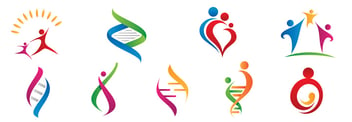DNA… Nurture Your Nature – Session Four
- Home
- Blog

Mind/Body Wellness, Gene by Gene!
DNA+Environment+Triggers+Chance = Your Health & Wellness
Enlightened Epigenetic Empowerment by Analyzing 32 Genes in Six Domains
– Bruce Alan Kehr, M.D.
“I feel happy.” “I feel bloated today.” “I’m in an awful mood and I don’t know why.” “I was in bed for eight hours, but am still so tired.” Reader, if there’s one thing we can count on in casual conversation, its talk of our mood and the weather. We often discuss these things as if they’re mysteries outside of our control—and, in the case of the weather, that may be the case (at least in the out-of-our-control category!) But, with the right knowledge, we can discover that not only are our moods—and our wellness—no mystery, but that in fact they are largely within our power to influence for the better. If you’ve been following along with my “Nurture Your Nature” series thus far, you know that alleles, glial cells, epigenetics, systems biology, upregulation and downregulation, homeostasis, “lucky” mutations and “unlucky” mutations are not just vocabulary words—together they comprise the underlying causes of your mood, your energy levels, and indeed, your very wellbeing. We’ve discussed all of these terms and more so far—but with this blog we’re going back to the basics. I want to discuss how, exactly, more knowledge of your personal genome directly translates into more power to positively influence the health of your mind/body connection, and all of the moods and energy states found therein. Let’s dig in!
Mapping Your Wellness: A Review
Like I’ve said previously, the work we’re doing in this series is not “fluff”—and it’s not light reading. We’re getting into some important science, and I know some of these keywords can be difficult to remember. So let’s do a quick review of what we’ve learned so far in this blog series. In Session 1, I discussed how the genetic test anchoring this series, Mindful DNA, differs from the test featured in the prior series, which focused on the Genecept Assay. Whereas the latter focuses on prescription medication solutions to difficult problems like depression, bipolar disorder, anxiety addiction, and psychosis through the application of “precision medicine,” Mindful DNA focuses on increasing your Healthspan over a matter of months and years through non-prescription interventions, such as targeted use of supplements, increased physical activity, and specific dietary and nutritional recommendations. These interventions work by taking advantage of epigenetics—the ability for us to tweak our gene expression toward the results we want.
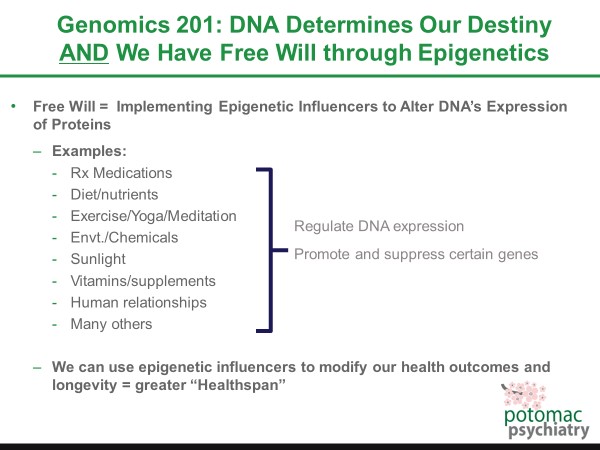
Session 2 explained why, exactly, physical changes can bring about mental changes (hint: The mind/body connection is very real—and rooted in systems biology!) This session also explained how Mindful DNA assesses 32 genes and breaks them down into three categories: risk (“vulnerability”), average (“wild-type”), and resilient. This sets the path for small, incremental changes over time to each gene’s expression: with tweaks to our habits, we can move our risk genes to average genes—thereby helping to prevent the onset of diseases like Alzheimer’s, stroke, heart attacks, high blood pressure, inflammatory bowel diseases, and diabetes. Session 3 framed our body’s complicated genetic balancing act with one word: homeostasis. Our trillions of cells are constantly receiving inputs and stimulation that tell them what to do—and when they receive too much or too little of those inputs, our body can fall out of balance (through a process called “upregulation” or “downregulation” of the DNA in your cells). Chronic inflammation is a great example of this—and all lifestyle changes suggested by Mindful DNA have the goal of not only returning your body to its equilibrium, but ensuring that your cells are not only doing what they’re supposed to do, but are in fact thriving.
Digging Deeper: Why Systems Biology is the Key to Your Wellness Future
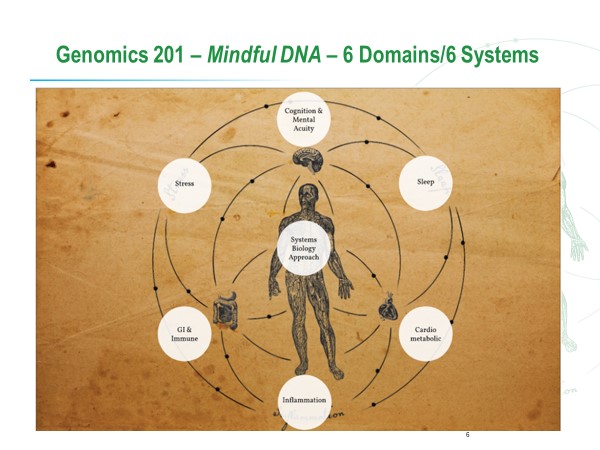
Now that you have a baseline knowledge of those keywords, it’s time the for the rubber to hit the road: why, exactly, does systems biology determine so much of our wellbeing, and what proof do we really have that changing our genome can change our healthspan outcomes?
Well, reader: I’m glad you asked.
As we’ve learned previously, Mindful DNA divides the genes behind our mind/body connection into six interrelated domains: sleep, cognition and mental acuity, stress, GI and immune, inflammation, and cardiometabolic. The test’s 32 genes dictate how we will most likely fare in every single one of these systems (also known as “domains”)—and help us determine how our external habits can in turn influence how our genes are regulated. It’s a fascinating cycle, and one where we all have the power to positively influence our health destinies.
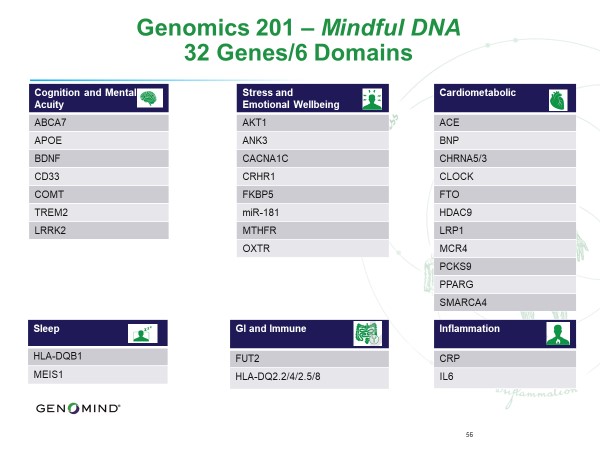
But where, exactly, does that power lie? The answer—by determining your particular genetic alleles within your personal genome. An allele is one member of a pair of genes that control the same biological process. One allele comes from our mother and the other comes from our father. The Mindful DNA test categorizes each allele in its 32 gene pairs as “risk” “average” or “resilient”. Most alleles fall into the middle category of average. The other two are actually mutations: unlucky or lucky, depending on which end of the spectrum they land upon.
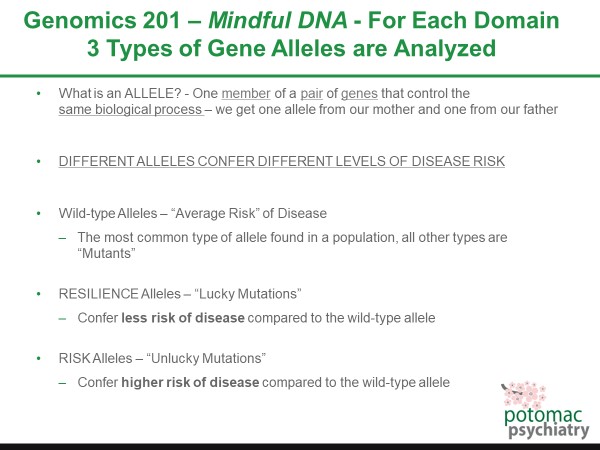
So, the power we have to change our destinies is synonymous to the power epigenetics has to change our gene expression through upregulating or downregulating our individual alleles. Our health habits can cause epigenetic changes in gene expression, the goal of which is to change the health effects of our “risk” alleles to average, and our “average” alleles to resilient.
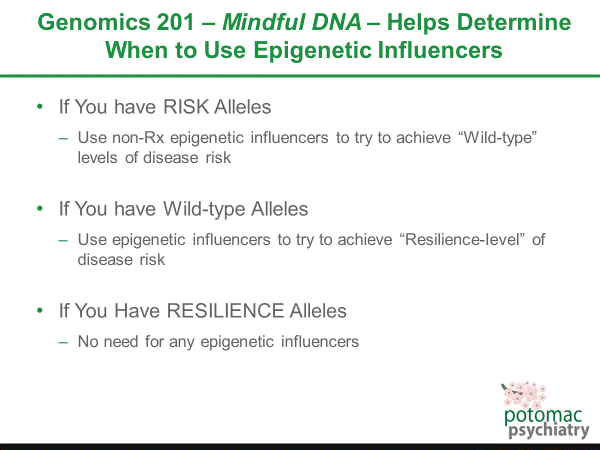
And here’s the good news: Thanks to the interrelated nature of our six domains, making changes to the expression a single gene, in the service of promoting better health, can bring about positive changes in a number of different domains. Here is a picture of how this works:
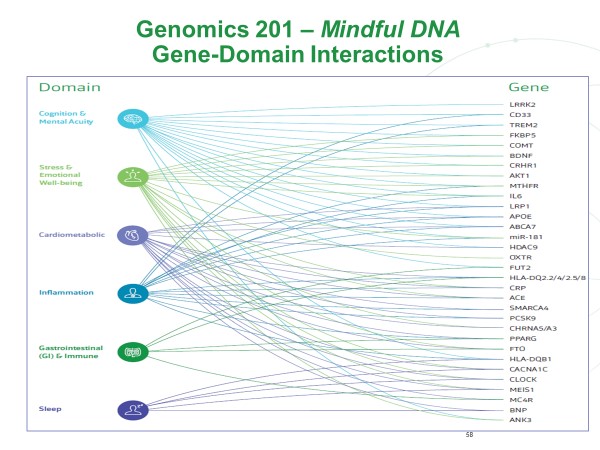
For instance, remember the BDNF gene—the one described as our ultimate “fertilizer” gene that produces proteins that support brain cell growth and synaptic connections (new learning) and so much more? Well, tweaking that single gene has a huge impact not just on your cognition and mental acuity, but also your stress and emotional wellbeing. This is a perfect example of the rubber hitting the road in terms of putting our understanding of systems biology to work for us.
Nurturing Your Wellness: Where’s the Proof?
After more than four decades in this profession, I can tell you that Mindful DNA and the knowledge it affords us to change our Healthspan destiny is one of the most exciting tools on the market today. Recommendations for specific epigenetic modifiers are based in four levels of scientific evidence, and each recommendation is assigned a level – full transparency. Preclinical evidence is based on studies limited to in vitro or animal models. Next, preliminary clinical evidence gathers information based on small human (less than 100) studies that they note require more investigation. The next level is clinical evidence based on one or more large studies (more than 100 participants). Finally, strong clinical evidence—based on multiple, large, well-control studies, meta-analyses with consistent results, and evidence-based treatment guidelines from major medical societies or governmental agencies.
In other words, once we determine the specific alleles in your personal genome—and Mindful DNA gives you the tools to know yours—we can begin to recommend epigenetic modifiers based in science – to make a big difference in your mood, your sleep, your stress, and everything in between—not just now, but for the rest of your life. And best of all, while your DNA will remain the same throughout your Healthspan, the science regarding specific epigenetic modifiers to improve your health and wellness will just keep advancing.
Related Information
- Learn about Genetic Testing
- Learn about Potomac Psychiatry
- Meet Our Doctors
- Contact Potomac Psychiatry
.png?width=144&height=144&name=Untitled%20design%20(34).png)



